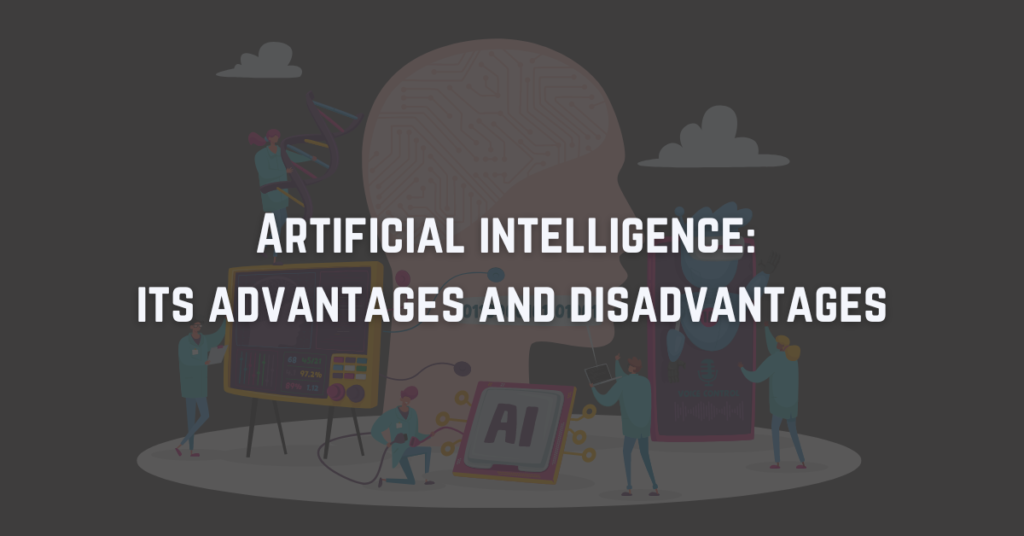
What is artificial intelligence?
The ability of a computer or machine to imitate human cognitive processes, such as learning and problem-solving, is known as artificial intelligence (AI). AI aims to develop systems capable of carrying out operations that require human intelligence, such as pattern recognition, language comprehension, and decision-making.
Artificial intelligence has different areas, namely cognitive science applications, robotics applications, and natural interface applications. Furthermore, each of these areas has its respective sub-areas. Their sub-areas are enumerated below.
- Cognitive science applications: expert systems, learning systems, fuzzy logic, genetic algorithms, neural networks, intelligent agents.
- Robotic applications: visual perceptions, tactility, dexterity, locomotion, navigation
- Natural interface applications: natural languages, speech recognition, multisensory interfaces, virtual reality.
Advantages of Artificial Intelligence
Efficacy and accuracy
AI is known to be good at what they are coded to accomplish; they are programmed in a manner that it can complete their targets tasks consistently in the most efficient way possible. Unlike humans, we are inconsistent; on some days, we feel like we can conquer every charge on our to-do list, while on some days, we struggle to finish any task. Consistency reduces human error in operations where artificial intelligence is chosen to be applied.
Suitable for repetitive and time-consuming tasks
Did you ever feel like getting bored of doing the same tasks over and over and over again? Well, I do. Some people (like me) prefer to work in an environment that is dynamic and does not have a rigid structure of tasks to finish. Fortunately, we have different artificial intelligence technology that are exceptional at dealing with repetitive tasks. This is what artificial intelligence is made for—continuous grinding of functions they are taught to do.
Unbiased decisions, quick decision-making
Embedded codes power Artificial Intelligence technologies, which make decisions based purely on logic and information from available learning systems. Moreover, AI can process vast amounts of data and provide insights and recommendations that humans may not be able to identify independently. They process their next step depending on the information that is being fed to them, and that is it. They do not have to weigh other external factors in their decision-making, making the process faster and more unbiased.
Makes life convenient
People often misunderstand AI as a threat that will conquer the world and replace humans in science fiction, but AI is designed to assist us in our daily lives. Siri, Google Maps, Speech Generation software, and more great tools we can utilize to improve our living. Google Maps is always available to lead you correctly if you are traveling. AI assistance can go as simple as asking Siri to send a message. It might not be massive for you, but for others, it could be, but the bottom line is the assistance that they provide generates convenience.
Better suited for risky tasks
Because they do not have feelings or emotions, AI systems are not prone to experiencing fear or anxiety, making them well-suited for tasks that may be dangerous for humans. Moreover, programmers can prioritize safety in AI systems by adding mechanisms that minimize risks. It is also important to note that they work with high precision, hence, the lower chances of committing mistakes that can trigger troubles.
Available 24/7
AI can work around the clock, even without any breaks. They can perform their tasks the whole day efficiently. Moreover, this can benefit firms as it will reduce labor costs. AI doesn’t require overtime pay because it never stops working. They can also continuously work efficiently throughout the day, sustaining the same output. This may increase the overall production of the firm.
Disadvantages of Artificial Intelligence
Cost (implementation, maintenance, and repair)
Implementing artificial intelligence in any field is undeniably expensive. Firms typically need to spend money on specialized hardware and software and skilled experts to design, develop, and maintain the AI systems to employ them to the best of their capabilities. Smaller organizations or firms on a tight budget might be unable to afford it.
Can affect job opportunities for human
Various AI systems develop, adapt and learn to perform a broader range of tasks. And humans working on these tasks can be potentially replaced. If implemented in an unregulated manner, this can result in massive job losses and unemployment in specific industries.
Lacks emotion and ethics
Some of the prominent flaws in this matter are the lack of emotions and ethical considerations in AI systems. The absence of emotions makes it challenging for AI to respond to relatively sensitive situations. As for ethical considerations, although decision-making is mostly unbiased and quick, some programmers’ ideals and beliefs can be discriminatory, which can be part of the AI systems. Moreover, lack of accountability is a problem with AI systems as their behavior cannot be held responsible. Identifying who or what is at fault is challenging if an AI system makes a choice that produces unfavorable results.
Lacks creativity
Although artificial intelligence systems can process and analyze vast amounts of data, they cannot typically come up with novel ideas or think creatively in the same manner humans do. This lack of imagination is a disadvantage when it comes to duties that call for creative thinking or the formulation of innovative solutions. Since creativity plays a significant role in many fields, this restricts the potential uses of AI.
Human dependency on AI
When we opt not to use our skills, it’s a lost opportunity for improvement. A decline in specific cognitive skills might happen among us if we become too reliant on AI technologies. We will be challenged to adapt in a generation where some of the things we are used to accomplishing can be achieved by AI and perform better. We will need to discover new skills or integrate ourselves into such situations.
Final thoughts
The rapid development of artificial intelligence in the current generation is something that we should welcome and not fear. If implemented in the right places and accompanied by proper regulation, AI can make things convenient and efficient. These new technologies powered by AI are meant to assist us with our simple daily tasks or complicated jobs.
References
Bhbosale, S., Pujari, V., & Multani, Z. (2020). National “eminar on “Trends in Geography, Commerce, IT And Sustainable “evelopment” (pp. 227–230). Aayushi International Interdisciplinary Research Journal.
Khanzode, K. C. A., & Sarode, R. D. (2020). Advantages and Disadvantages of Artificial Intelligence and Machine Learning. International Journal of Library & Information Science, 9(1), 30–36. http://www.iaeme.com/IJLIS/issues.asp?JType=IJLIS&VType=9&IType=1
Osipov, S. S., & Ulimova, N. V. (2017). Advantages and Disadvantages of AI. International Scientific Journal, 1(4), 77–80.

